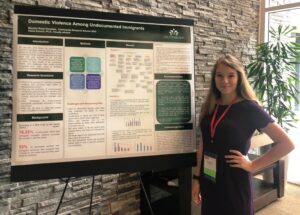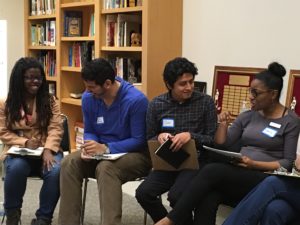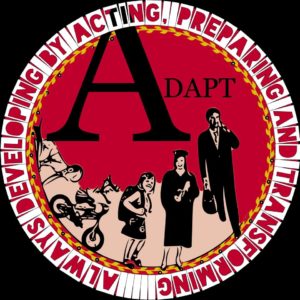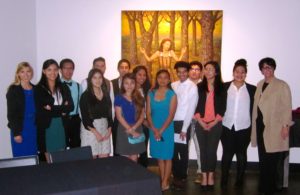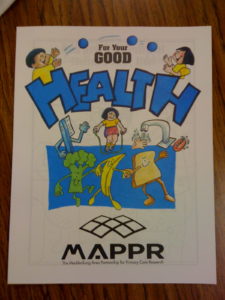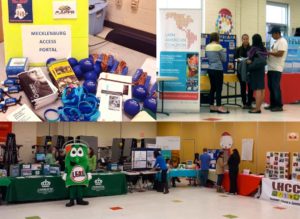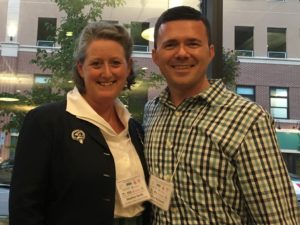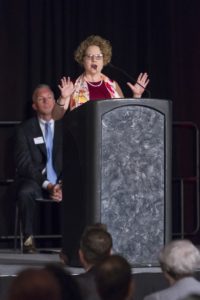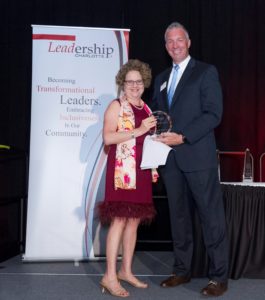Representative Partnerships, Projects and Roles of RISING members
Project: Examining Domestic Violence Reporting and Legal Action for Immigrants in Charlotte-Mecklenburg (2018-2020)
RISING Member Roles: Study design, data collection and evaluation, report writing, community and academic dissemination.
Partners: Mayra Stefania Arteaga from Comunidad Colectiva and the ACLU, and Melissa Siegel Barrios, an evaluation consultant with NC Coalition against Domestic Violence (NCCADV) and NC Coalition against Sexual Assault (NCCASA).
This project examined domestic violence (DV) among immigrants – particularly those who are undocumented – in Charlotte-Mecklenburg, North Carolina. We investigated the estimates of immigrants going through the reporting and legal action DV processes in Mecklenburg County, and how has this changed over time; what the processes are for reporting DV and pursuing legal action in Mecklenburg County, and what challenges immigrants encounter in these processes; and what can be done to make the system more navigable for immigrants. We collected quantitative data and interviews from the local police department, courts, and various domestic violence and immigrant-serving organizations.
Products:
– Schuch, J.C., Siegel Barrios, M., Arteaga, M.S. and Rojas, B. (2019). Examining Domestic Violence Reporting and Legal Action for Immigrants in Charlotte-Mecklenburg. Final report and Infographics.
March 2018
RISING member Silva Mathema recently published several articles:
– Innovative Approaches to Improving Refugee Integration
– They Are (Still) Refugees: People Continue to Flee Violence in Latin American Countries
– Revival and Opportunity: Immigrants in Rural America
An interview with Drs. Smith and Schuch was featured in the UNC Charlotte Exchange magazine, Fall 2017 (pages 18-19).
Project: Nuevolution exhibit and Nuevo Dia dialogues (2015-2017)
RISING Member Roles: Development of Community Dialogue Program, Iterative Assessment of Dialogues, Program Evaluation
Partner: Levine Museum of the New South
NUEVOlution! is an exhibit of national significance that explores the ways in which Latinos are shaping the South and the South is shaping Latinos. The exhibit was featured at the Levine Museum of the New South from September 2015 to November 2016. To enhance the impact of the exhibit, the museum held 66 community dialogues and a ten-month sustained dialogue program with diverse emerging Charlotte leaders. These dialogues aimed to strengthen participants’ understand of the growth of Latinos in the South, their cultural competence, their ability to identify and address obstacles to access and inclusion in our Charlotte community and their spheres of influence. The museum partnered with UNC Charlotte researchers Susan Harden, Heather Smith, and Claire Schuch to develop the dialogues and conduct an evaluation to see if goals were met. Tools included dialogue observations, participant surveys, focus groups, video interviews and journals.
Partners: Atlanta History Center, Birmingham Civil Rights Institute. Close to 900 people participated in the dialogues.
Products and Coverage:
- Schuch, J.C., Harden, S. B., Smith, H. A (2018). Nuevo Dia Sustained Dialogue Evaluation Report. Prepared for the Levine Museum of the New South.
- Nuevo Dia Sustained Dialogue video. Created by Barbara Lash, with interview footage conducted by Claire Schuch and Barbara Lash.
- Schuch, J.C., Harden, S. B., Smith, H. A (2017). Nuevo Dia Intact Dialogue Evaluation Report. Prepared for the Levine Museum of the New South.
- Diaz, E. (2014). The Nuevo South: A Changing Landscape. Huffington Post.
- Smith, A. (2015). 9 Charlotteans you’ll see in the Levine Museum’s Nuevolution. Charlotte Magazine.
- Washburn, M. (2015) Levine Museum exhibition tells the story of Hispanic growth in the South. The Charlotte Observer.
- Arts Fwd (2015). Innovation lab on the Latino New South.
- Andrés, B. J. (2016). Exhibit Review: ¡NUEVOlution! Latinos and the New South, Levine Museum of the New South, Charlotte, NC. The Public Historian.
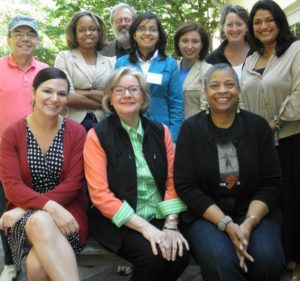
Latino New South Innovation Lab Team, including RISING members Tom Hanchett, Emily Zimmern, and Heather Smith
Project: Socio-spatial geographies of Hispanic immigrant youth accessing the urban labor market (2014-2016)
RISING Roles: Principal Investigator
Partner: Youth Adapt NC
The National Science Foundation (NSF) and Society of Woman Geographers (SWG)-funded dissertation titled Socio-spatial geographies of Hispanic immigrant youth accessing the urban labor market. This study, led by Claire Schuch, combined interviews, questionnaires, journaling, mental mapping, and a participatory action research (PAR) project to examine the lived experiences of Hispanic/Latino(a) immigrant youth as they navigate the labor market. Research questions addressed how youth are transitioning into the workforce in an age of labor insecurity, anti-immigrant sentiment and policy; what the challenges are; and how the youth propose to improve their job access. Attention was paid to how differences in documentation status, and other demographic and neighborhood variables, affect job access and how youth perceive their opportunities. Applying a mixed-methods, multi-scalar approach, this study captured how the personal and the local interconnect with the institutional at the local, state and national level. The group and website Youth ADAPT NC was formed out of the PAR project to inform immigrant youth about job-related information.
Partners: The Latin American Coalition. 36 youth participants.
Products and Coverage:
- Schuch, J.C. (2018) Socio-spatial Practices of Hispanic Youth Navigating their Labor Market Opportunities. Hispanic Journal of Behavioral Sciences, 40(3).
- Schuch, J. C. (2018) Youth ADAPT NC: A Participatory Action Research Project With Hispanic Youth Aimed at Enhancing Career Opportunities. Journal of Community Engagement and Scholarship, 10(2), 54-68.
- Newspaper articles in Hola Noticias:
- Estereotipos y prejuicios impactan acceso a mercado laboral de jóvenes latinos (Stereotypes and prejudice impact access to labor market for Latino youth), published 12/16/14;
- Crean página web para búsqueda de empleo (Creating a website for job search), published 3/31/2015;
- Ayudan a jóvenes a buscar empleo en la web (Helping youth find employment on the web), published 4/14/2015
- UNC Latino Migration Project (2015) Youth ADAPT NC
Project: Social Determinants of Health (2010 – 2015)
RISING Member Roles: Proposal Development, Co-Investigators, Project Management, Graduate Research Assistance, Qualitative Methods and Community Based Participatory Research Oversight.
Partner: Mecklenburg Area Partnership for Primary-care Research (MAPPR)
National Institute of Minority Health and Health Disparities (NIMHD)-funded study titled A Transdisciplinary Approach to the Evaluation of Social Determinants of Health.
This project focused on enhancing healthcare access and improving health outcomes for underserved Hispanic immigrants in Mecklenburg County, North Carolina using a community-based participatory research (CBPR) framework. We employed qualitative, quantitative and GIS-based data analyses to identify factors affecting access to primary care and subsequently developed, executed, and evaluated interventions to improve community health, including nine health and wellness fairs, and two year-long neighborhood-based exercise and education groups.
This research was conducted by the Mecklenburg Area Partnership for Primary-care Research (MAPPR), an established interdisciplinary group of healthcare providers and researchers from UNC Charlotte and Carolinas Healthcare System working under the directorship of Dr. Michael Dulin. The intervention was a collaboration between the research team, social and health service representative, over 60 community volunteers, and over 200 Hispanic immigrant participants. The Community Advisory Board included the Latin American Coalition, Charlotte-Mecklenburg Schools, Bethesda Clinic, the City of Charlotte Neighborhood and Business Services, and the Mecklenburg Health Department.
Products and Coverage:
- Coffman, M. J., Hernandez, B. U., Smith, H. McWilliams, A., Taylor, Y., Tapp, H., Schuch, J. C., Furuseth, O., Dulin, M. (2017). Using CBPR to increase access to health care services in suburban Latino neighborhoods. Hispanic Health Care International, 15(3), 121-129.
- Robert Wood Johnson Foundation (2015). Research Designed Through the Eyes of Youth.
- Schuch, J. C., de Hernandez, B. U., Williams, L., Smith, H. A., Sorensen, J., Furuseth, O. J., & Dulin, M. F. (2014). Por nuestros ojos: understanding social determinants of health through the eyes of youth.Progress in community health partnerships: research, education, and action, 8(2), 197-205.
- Dulin, M. F., Tapp, H., Smith, H. A., De Hernandez, B. U., & Furuseth, O. J. (2011). A community based participatory approach to improving health in a Hispanic population. Implementation Science, 6(1), 38.
- Dulin, M. F., Ludden, T. M., Tapp, H., Smith, H. A., de Hernandez, B. U., Blackwell, J., & Furuseth, O. J. (2010). Geographic information systems (GIS) demonstrating primary care needs for a transitioning Hispanic community.The Journal of the American Board of Family Medicine, 23(1), 109-120.
Project: Changing Places exhibit and Speaking of Change dialogues (2009-2015)
RISING Roles: Community Dialogue Evaluation
Partners: Levine Museum of the New South, UNC Charlotte
Changing Places, which explored the diversity of growing immigrant populations in Charlotte, was an exhibit at the Levine Museum of the New South, from 2009-2010, billed as one of the Museum’s most ambitious projects to date. Coinciding with the exhibit, Speaking of Change dialogues brought community members from many sectors of the community (private business, nonprofit, faith-based, education, government, etc.) through the Changing Places exhibit and then through a facilitated dialogue program to discuss relevant issues. UNC Charlotte and RISING researchers Paul McDaniel, Susan Harden and Heather Smith conducted process and content observations of 12 of the 98 dialogues. 1,285 participants also completed a post-dialogue survey. Through an evaluation of the program, the dialogues were shown to have changed participants’ thinking about immigration, cultural change and diversity. Findings demonstrate how, through its exhibit and dialogue programming, the museum deepened understanding of immigration in ways that led to a warmer welcome and proactive inclusion. This research illuminates the critical role of museums in guiding community receptivity towards immigrants in a way that provides counterbalance to reactive or hostile responses.
Products and Coverage:
- McDaniel, P. (2015) How a cultural institution can shape receptivity in a new immigrant destination. The Migrationist.
- Harden, S. B., McDaniel, P. N., Smith, H. A., Zimmern, E., & Brown, K. E. (2015). Speaking of change in Charlotte, North Carolina: How museums can shape immigrant receptivity in a community navigating rapid cultural change. Museums & Social Issues, 10(2), 117-133.
- Harden, S. B., Smith, H. A, McDaniel, P. N. (2010). Speaking of Change Evaluation Report. Prepared for the Levine Museum of the New South.
Project: New Courage: The Issues Today, The Guts to Face Them (2012)
RISING Roles: Program Evaluation
Partners: Levine Museum of the New South, UNC Charlotte, Charlotte-Mecklenburg Schools
On January 15, 2011, Levine Museum of the New South, in celebration of its twentieth anniversary, reopened their award-winning exhibit COURAGE: The Carolina Story that Changed America. In conjunction with the Courage exhibit, the Museum also unveiled a new exhibit, Para Todos Los Niños: Fighting Segregation before Brown v. Board. The exhibits complemented one another with both exploring the context, experience, and outcome of minority community members battling for equitable access to public education. In partnership with Levine Museum of the New South and Charlotte Mecklenburg Schools, the goal of the New Courage project involved the museum inviting high school students to explore issues requiring courage today. This report provides an evaluation of the process of the New Courage project. Through curriculum-based classroom activities, exhibit visits, dialogue, programs, and creation of a New Courage exhibition of original student works, teenagers and young adults learned and experienced firsthand norms of responsibility, trust and reciprocity. Participating high school students used creative expression to strengthen critical and cross-disciplinary thinking and achieve specific curriculum objectives. All components of New Courage were guided by three principles: 1) Show respect for young people by treating them with dignity and praising their achievements; 2) Provide meaningful engagement by addressing significant problems or passions identified by young people, and show how history shapes those issues today; 3) Inculcate civic values by enhancing participants’ development through high expectations, sustained by adult support and a peer group with explicitly positive values, and by shaping experiences that demonstrate the knowledge and skills needed to have influence in community affairs.
Products:
- Harden, S. B. & McDaniel, P.N. (2012) New Courage: The Issues Today, The Guts to Face Them Evaluation Report. Prepared for the Levine Museum of the New South.
Project: Courage in the City: Education Equity in the Multicultural South (2011)
RISING Roles: Community dialogue evaluation
Partners: Levine Museum of the New South, UNC Charlotte
This report provides an overview of the evaluation data from the Levine Museum of the New South’s community dialogue program developed in conjunction with the opening of the paired exhibits COURAGE: The Carolina Story that Changed America and Para Todos Los Niños: Fighting Segregation before Brown v. Board. Through these dialogues the museum sought to spark meaningful discussion across racial and ethnic boundaries about issues of education and social justice. Drawing from information provided by dialogue participants through silent reflection, dialogue observation, survey responses and follow-up interviews, the report focuses on the extent to which the dialogue process was successful in achieving the museum’s three main goals for the program. These goals were to 1) Increase awareness and knowledge of the history of African Americans and Latinos to secure equal educational opportunity; 2) Facilitate recognition of multiple perspectives used by citizens of different backgrounds to explain the past, evaluate the present, and project the future; 3) Encourage inclusive actions at the individual, organizational, or community level.
Products:
- McDaniel, P. N., Harden, S. B., Smith, H. A (2011). Courage in the City: Education Equity in the Multicultural South Evaluation Report. Prepared for the Levine Museum of the New South.
